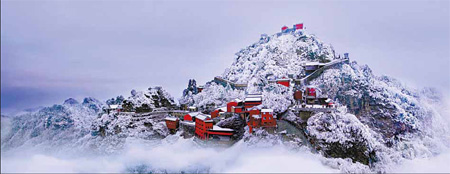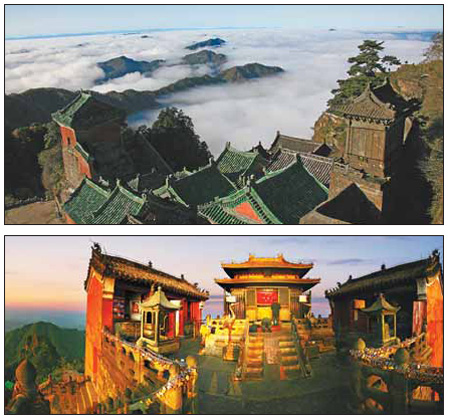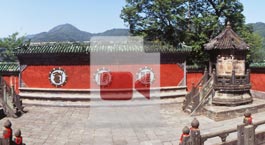Divine views from Golden Summit
By Erik Nilsson ( China Daily )
Updated: 2009-11-12

The snow-capped Golden Summit is the peak attraction of Wudang Mountains, in Hubei province.

The snow-capped Golden Summit is the peak attraction of Wudang Mountains, in Hubei province.
While the story of Zhen Wu's transformation into an immortal may be a myth, the Taoist's undying legacy has had a real impact on Wudang Mountains.
This ancient saga has made the mountain range in today's Hubei province a place of pilgrimage for contemporary believers of archaic China's only native religion. And the area's magnificent scenery, fascinating folklore and indigenous kungfu lure travelers of other theological persuasions, too.
The peak attraction in Wudang is Jinjian (the Golden Summit), which shines as the alpine range's highest and most sacred point.
Visitors reach the 1,612-m-high apex by taking a 25-minute ride on a 1.51-km-long cableway from Chongtai. This location partway up the mountain is where Zhen Wu is said to have transmuted into a god more than two millennia ago. Rugged types can take on the three-hour slog up the alp, before trudging for two hours back down.
As various emperors ordered the construction of several temples on the summit over the centuries, the pinnacle took on the shape of an enormous tortoise tussling with a gargantuan serpent.
The compound of buildings enclosed by Divine General Wang's Wall form the animal's shell, while one of the nine rocky protrusions near the summit is the creature's head. Leading up to these structures is a zigzagging set of 168 stone steps, which form the "snake's body". In Chinese, the number represents "yi lu fa", which means, "to become wealthier".
General Wang, the guardian of Taoism whose statue is set in one of the shrines along the wall, is rendered with a long beard and three eyes. He is clad in a crimson robe worn beneath golden armor and brandishes magical charms in his left hand.
The construction of holy edifices on the Golden Summit began with an order from Tang Dynasty (AD 618-907) Emperor Li Shimin (626-649).
When drought baked his lands, the ruler sent ministers to many sacred mountains around the empire to pray for rain. But it was only after court official Yao Jian went to Wudang Mountains and invoked Zhen Wu, who became the Taoist water deity upon attaining immortality, that downpours came.
So the ingratiated emperor ordered the construction of Wolongsi, the area's first temple.
More sacred edifices were built in the Yuan Dynasty (1271-1368), including the Turnaround Palace, originally erected at the very highest point and relocated further down the slope in the Ming Dynasty (1368-1644).
Visitors to this venerated hall squeeze into a cramped, dark corridor surrounding a shrine of Zhen Wu that is walled-in on three sides. With their bodies squished between the back walls of the temple and those of the shrine, they must walk sideways, feeling their way through the inky blackness to encircle the sacred statue.
When they pop out into the light on the other side, they will have earned good fortune.
The Turnaround Palace was relocated during the Yongle Period (1403-1425) of the Ming Dynasty, when Wudang Mountains took on new prominence.
|
 |
|
Wudang's magnificent scenery, well-preserved relics and fascinating folklore make it both a place of pilgrimage and a popular tourist attraction. |
This was because the maleficent uncle of the widely beloved Emperor Zhu Yunwen became the dynasty's third ruler when he usurped his staunchly Confucian nephew.
The common people railed against the new regime, so Zhu Di declared he had assumed the throne to answer a divine calling issued by Taoist gods and championed by Zhen Wu. In this way, he hoped to quell popular ire by legitimizing his ascendancy.
It worked. Taoism eclipsed Confucianism as the kingdom's predominant belief system, and Wudang became a hallowed icon of this new political and religious order.
Zhu Di was particularly sly in his cooption of Taoism to justify his authority. He gathered the country's top artists to paint portraits of Zhen Wu, but ordered nearly all of them to be executed for failing to depict the divinity to his satisfaction - that is, until one calculating painter rendered the god's image to resemble the emperor's, much to the ruler's glee.
The slick artisan finagled this by smuggling a lump of clay into the court when he met Zhu Di, with whom he couldn't hold eye contact, on punishment of death. He stealthily sculpted the sovereign's face based on his fleeting glimpses, so he could reference it later.
Zhu Di also ordered the construction of several sacred edifices on the mountaintop that had the same basic layout as the Imperial Palace in Beijing.
Thus came about the saying, "The Imperial Palace is the place for the emperor to live; Wudangshan is the place for the emperor to rule".
The crown jewel of the treasure trove of buildings on the summit is the Golden Palace, which is located atop the mountain's crest, where the Turnaround Palace had stood.
Construction began in 1416 and took 12 years. Because of the religious and political importance of this new emblem, Zhu Di ordered each part of the gold-plated bronze structure to be created by top craftsman in Beijing. These sections were then transported from the capital to the mountaintop, where they were assembled. Featuring a traditional double-roof and nine-bracket structure, the Golden Palace is 5.8-m-long, 4.2-m-wide and 5.54-m-tall.
It warehouses a statue of Zhen Wu, along with the figures of a cast of Taoist characters - the Golden Boy, the Jade Maiden, the Snake and Turtle Generals, and the fire god.
Mysteriously, it also contains a memorial flame that has not died in more than six centuries, even though the building has been tightly sealed up.
But for all of its consequence to Zhu Di and his predecessors, no emperor, including him, ever visited Wudang.
After Zhu Di's era, the location's eminence diminished until the Jiajing Period (1521-1567).
It was then that Ming Emperor Zhu Huocong, who had been trying in vain for years to beget a son, sent ministers to pray to Zhen Wu. After the officials beseeched the divinity to bless the ruler with a male heir, he sired many.
Today, believers still come to the Golden Summit to pray to Zhen Wu, bearing offerings of rice and oil. Should their requests come true, they are obligated to return to the mount to perform ceremonies demonstrating their gratitude.
Visitors can stay overnight at the summit's only hotel, Wudangshan Zhi Jing Hua. Rates run from 120 to 180 yuan ($17.6-26.4) a night, with the pricier lodging offering breathtaking vistas of the rocky knobs and wispy pines spangling the peak.
While it is said it took Zhen Wu 42 years of self-cultivation to become immortal, the Golden Summit bears testimony to the everlastingness of his legacy.



